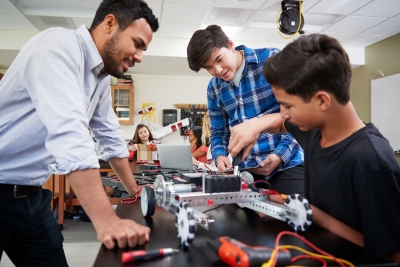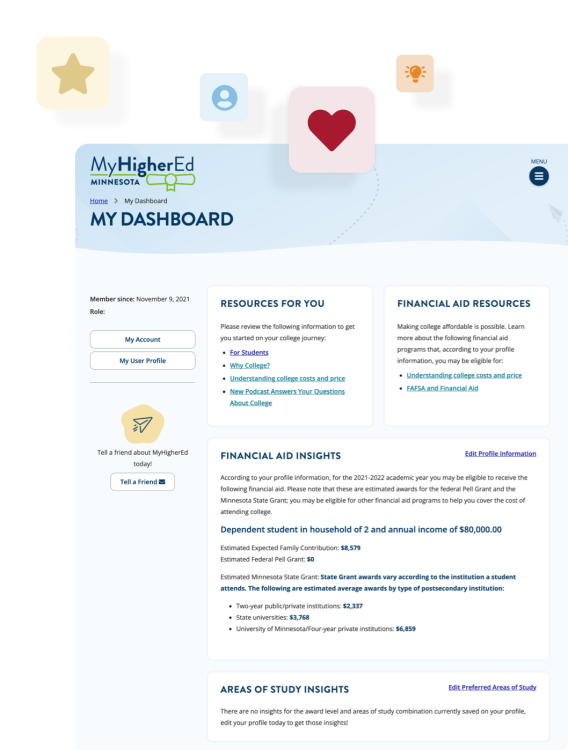Going to college is an exciting experience for your kid and your family. Letting them know that they can count on you to assist them and support them during this transition will strengthen the trust they place on you. Beyond the main decisions to be made regarding their program of study they prefer, the institution they attend, and how they can finance their education, there is a broader conversation you can start with them to prepare them for the challenges of their lives ahead, both academically and personal.
Navigating the transition from high school to your child’s postsecondary option can be challenging. Make sure that your kid, soon to be an independent adult, understands the responsibility that comes with making independent choices about their lives and how to best manage their decision-making when faced with multiple options. Even if they don't express it, having your support during this stage is a bid deal.
What To Expect
Engaging in an honest conversation with them about their academic and career goals could positively impact their experience. Keep in mind that their classes will likely be more rigorous and they will be responsible for applying themselves to succeed. Helping your young adult be prepared for what lies ahead can make that shift smoother for them and the family as a whole. Here is a list of areas where college-bound kids are likely to experience a shake-up. During your conversations with them, you may want to discuss these and other factors to be aware of during one of the biggest transitions of their lives.

College classes
One big difference between high school courses and college courses, you may want to stress for your students, is the level of class rigor. This includes a change in the amount of homework, testing and use of different learning methods.
Even in Advanced Placement or Dual Credit courses, students are frequently assigned nightly homework and reading. However, in many introductory college classes there will be relatively few assignments throughout the semester, with a greater emphasis placed on midterm exams and final exams, or perhaps a large paper/project. Those will determine a student’s grade for the class. This may mean less time-consuming busy work, but far more pressure to do well on each assignment since it counts for such a large percentage of the overall grade.
In college, students are treated like adults and are trusted to make their own decisions. That includes choosing whether to attend class. While some professors do take attendance and may count it toward an overall grade, others do not, and leave it up to students to determine whether to attend.
College Instructors
While in elementary, middle and high school students are taught by teachers whose purpose and passion is to educate students, sometimes on a variety of topics. First and foremost, they are specialized in educating and committed to helping their students learn core material and succeed.
Professors, on the other hand, are first and foremost academics or experts in the subjects they are teaching. This is a great, in that students learn from someone who knows more about what he or she is teaching than most. The downside is that some college students may not always get a professor who is well versed in the most effective teaching techniques, or as comfortable leading a classroom.
Schedules
It may not be surprising to you how different class scheduling is in college compared to high school. The high school environment is much more rigid and consistent, with students required to attend for a set number of hours every day. The only flexibility they have is choosing a few elective classes to take during those hours. And even those choices can be quite limited, given state and federal benchmarks and standards that each student must meet.
In college, on the other hand, determining a class schedule can be complex. Classes can occur anytime from 8 a.m. to 9 p.m., and students often find themselves with hours of gaps in between classes. There are times when a student’s desired classes overlap, don’t fit into his or her schedule, or are at capacity. One way to help is to ensure students understand the college class scheduling process and are prepared. They should spend time before the course registration period opens to choose which courses are needed and be ready to schedule them once registration opens.
Discovering their interests
An important part of the transition to college is to help you child discover their interests and passions. This may have started in high school but it becomes a bit more important in college. Part of the transition is having your child think about what degree or certificate they want to earn and most counselors will encourage students to study what they are passionate about.
Studies have shown that students tend to do better in subjects they are passionate about. And in college there are all type of classes for students to explore. But it’s not just about doing better academically, students who study subjects they are passionate about are happier and tend to have other positive outcomes while in college and after they graduate.
And discovering student’s passion what they want to study is the start of helping your child think about a possible career path.
Coming up with a career path
There are a lot of reasons to go to college but one important reason is to start preparing for a career. What students study in college can play a major role in what career options students have. If your child is interested in being a doctor or a nurse they should take different courses than if they want to be a marketer or accountant —so students should start thinking about their potential careers.
Helping your child figure out their entire career is probably not going to happen, but helping them think about careers, what’s after college, and what they like to do are important first steps. Their college or postsecondary institution will have lots resources and will help your child work through planning their next steps. You also have experiences and insights that will help students work through the reality of what’s after college and their career ahead.
A great resource for this task is our latests guide Choosing A Career Pathway. You may download it or order a single printed edition on us (free delivery).




